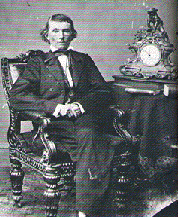
| Stephens was briefly imprisoned after the war, at Fort Warren, in New York. While there he kept a diary in which he wrote (among other things) these reflections on what came to be known as "the Cornerstone Speech." |  |
As for my Savannah speech, about which so much has been said and in regard to which I am represented as setting forth "slavery" as the "cornerstone" of the Confederacy, it is proper for me to state that that speech was extemporaneous. The reporter's notes, which were very imperfect, were hastily corrected by me; and were published without futher revision and with several glaring errors. The substance of what I said on slavery was, that on the points under the old Constitution out of which so much discussion, agitation, and strife between the States had arisen, no future contention could arise, as these had been put to rest by clear language. I did not say, nor do I think the reporter represented me as saying, that there was the slightest change in the new Constitution from the old regarding the status of the African race amongst us. (Slavery was without doubt the occasion of secession; out of it rose the breach of compact, for instance, on the part of several Northern States in refusing to comply with Constitutional obligations as to rendition of fugitives from service, a course betraying total disregard for all constitutional barriers and guarantees.) I admitted that the fathers, both North and South, who framed the old Constitution, while recognizing exsisting slavery and guaranteeing its continuance under the Constitution so long as the States should severally see fit to tolerate it in their respective limits, were perhaps all opposed to the principle. Jefferson, Madison, Washington, all looked for its early extinction throughout the United States. But, on the subject of slavery -- so called -- (which was with us, or should be, nothing but the proper subordination of the inferior African race to the superior white) great and radical changes had taken place in the realm of thought; many eminent latter-day statesmen, philosophers, and philanthropists held different views from the fathers. The patriotism of the fathers was not questioned, nor their ability and wisdom, but it devolved on the public men and statesmen of each generation to grapple with and solve the problems of their own times. The relation of the black to the white race, or the proper status of the coloured population among us, was a question now of vastly more importance than when the old Constitution was formed. The order of subordination was nature's great law; philsophy taught that order as the normal condition of the African amongst European races. Upon this recognized principle of a proper subordination, let it be called slavery or what not, our State institutions were formed and rested. The new Confederation was entered into with this distinct understanding. This principle of the subordination of the inferior to the superior was the "corner-stone" on which it was formed. I used this metaphor merely to illustrate the firm convictions of the framers of the new Constitution that this relation of the black to the white race, which existed in 1787, was not wrong in itself, either morally or politically; that it was in conformity to nature and best for both races. I alluded not to the principles of the new Government on this subject, but to public sentiment in regard to these principles. The status of the African race in the new Constitution was left just where it was in the old; I affirmed and meant to affirm nothing else in this Savannah speech. |
Back to Causes of the Civil War (Main page) Back to Other Political Speeches and Correspondence Source: Recollections of Alexander H. Stephens: His Diary kept when a prisoner at Fort Warren, New York: Doubleday, Page & Co., 1910., pp 172-174. Entry for June 5, 1866. Date added to website: On or before July 5, 1998 |